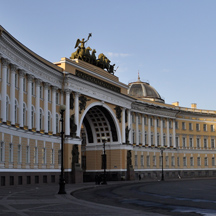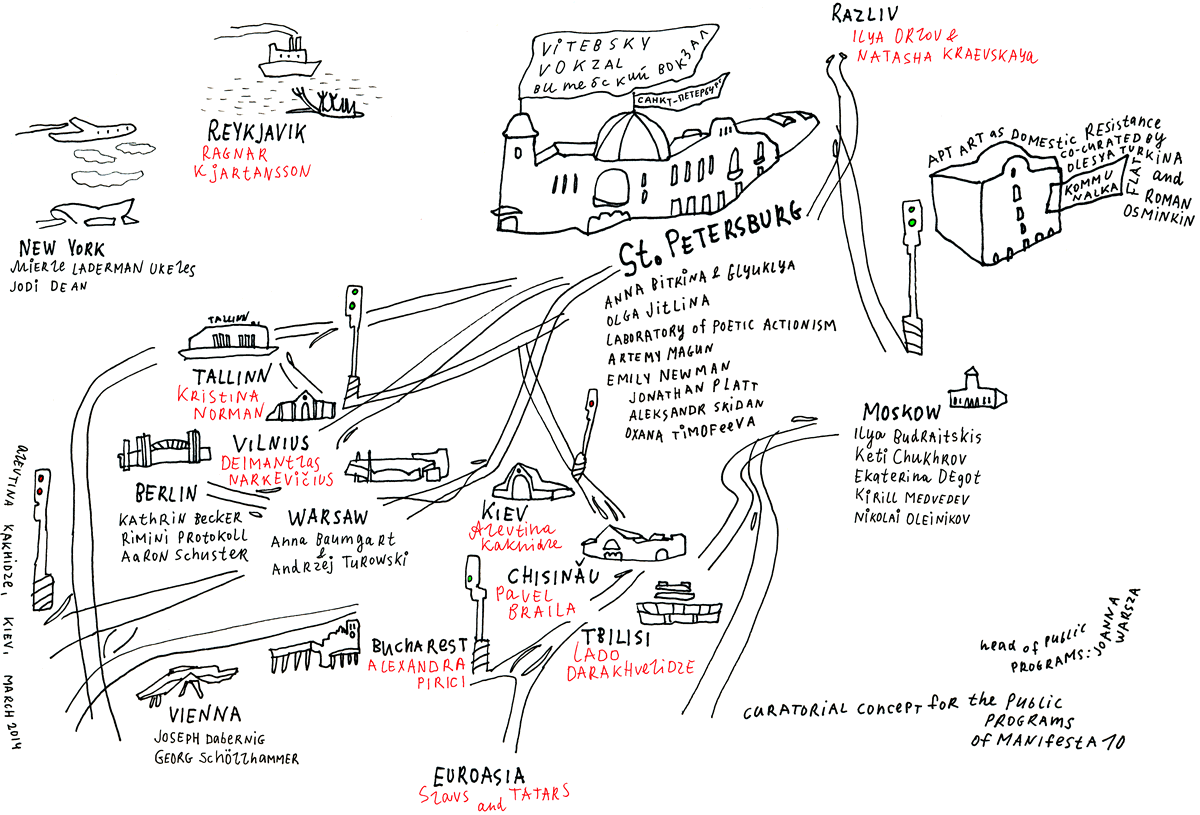
The European Biennial of Contemporary Art
28 June 31 October 2014
St. Petersburg, Russia The State Hermitage Museum
Public Program
The Public Program will critically respond to the current social-political circumstances, its conflicts and complexities, and the place of art within them. A series of time-based projects will intervene in the city of St. Petersburg and its cultural, historical, and social complexity with context-responsive commissions and debates, events, pop-up shows, and discursive platforms, as an integral part of the exhibition. Because the Program engages with the urgency of unfolding geo-political circumstances, the full list of the contributors and places is in flux.
The invited artists mostly originate from cities of post-Soviet and post-communist Europe including Vilnius, Tallinn, and Kiev. These cities are all accessible by train from St. Petersburg’s Vitebsky Station, which will be a key venue for the Public Program as the first train hub in Russia to connect the East and West—its name bearing homage to the famous city of the early twentieth century Russian avant-garde.
The Public Program also refers to the role of the private, the public, and their respective social and political contexts during the USSR era, as well as in the current post-Soviet condition and geo-political situation. During the Soviet Union, ‘public’ (understood as a critical exchange of free thoughts) almost exclusively took place at home universities, secret political gatherings, and through inner emigration and apartment exhibitions—where unofficial, nonconformist, engaged art was hosted as a form of resistance.
One of the projects will be an exhibition on Apartment Art as Domestic Resistance, co-curated with St. Petersburg-based art historian Olesya Turkina and located in one of the former communal flats.
Artists contributing with time-based performative works: Pavel Braila (Moldova), Lado Darakhvelidze (Georgia/NL), Alevtina Kakhidze (Ukraine), Ragnar Kjartansson (Iceland), Deimantas Narkevičius (Lithuania), Kristina Norman (Estonia), Ilya Orlov and Natasha Kraevskaya (Russia), Alexandra Pirici (Romania), and Slavs and Tatars (Eurasia).
A number of artists and participants will engage in public events, including: Anna Baumgart and Andrzej Turowski (Poland), Kathrin Becker (Germany), Anna Bitkina (Russia), Ekaterina Degot (Russia), Gluklya (Natalia Pershina-Yakimanskaya, Russia/NL), Pavel Arseniev (Russia), Emily Newman (USA/Russia), Jonathan Platt (USA/Russia), Rimini Protokoll (Germany), Aaron Schuster (USA), Mierle Laderman Ukeles (USA), and many more to be confirmed.
Staging a dialogue between the informal and the official, the Public Program will look into St. Petersburg’s history and present, investigating the intricacies and contradictions of the city, revealing local idiosyncrasies, and exploring ideas of the private, the public, and the political.
Giving context to her program within the MANIFESTA 10 project as a whole, Warsza has said:
“This is in fact one of those moments when art is especially needed if it has a pretention to engage in a critical way with the complexities and conflicts of our time. The projects will obviously not represent the position of the Russian government. I believe that as long as we can work in a complex manner and in a context-responsive way, and as long as we—curator, artists, team—are not exposed to self-censorship, and not intimidated or restricted, we will continue to do so. In this contested time, one should not equate people, and our audiences, as equal to their governments.”
Joanna Warsza (PL),
Curator of the Public Program
Joanna’s curatorial practice is largely based in the public realm, operating within political, social, staged, and performative situations and related issues. Most recently, she was curator of the Georgian Pavilion at the 55th Venice Biennale and the associate curator of the 7th Berlin Biennale. Joanna has long been interested in the former countries of the USSR, having pursued research on contemporary art in Georgia, Armenia, Azerbaijan, Moldova, Ukraine, Belorussia, and the Baltic countries. Her program will refer to the political urgency, the Russian-Ukrainian crises as well as the role of the private and the public, both during the USSR era, as well as in the current post-Soviet condition. Joanna is based in Berlin and Warsaw.







